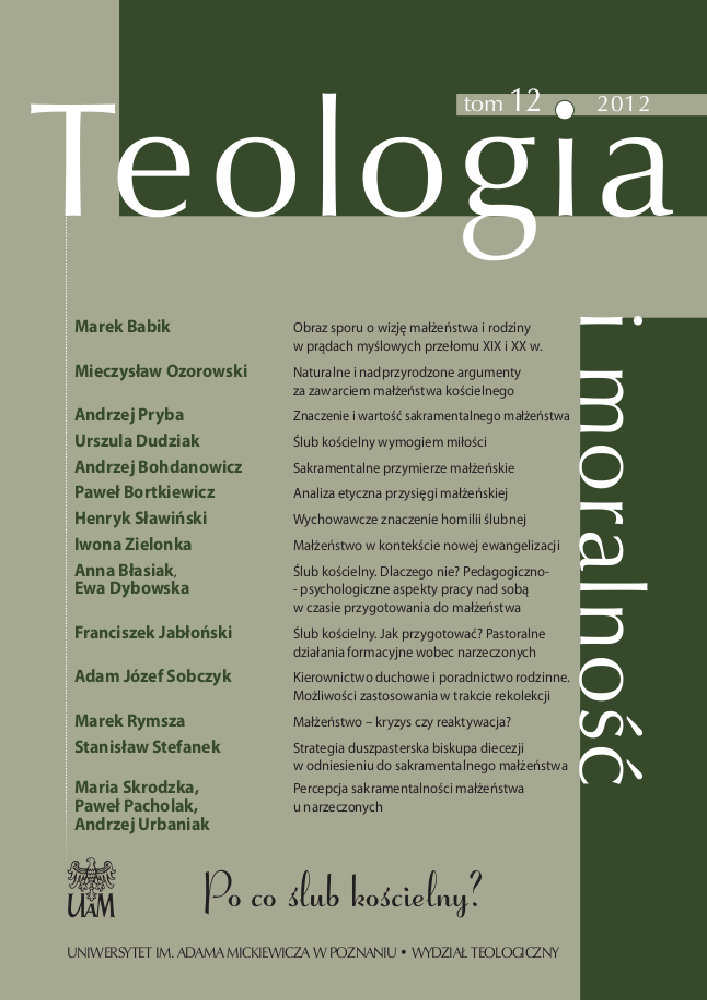Abstract
The article analyzes the situation of violence in the family and its impact on dysfunctional roles of its members. The problem is viewed in the context of sociological data and selected aspects of assistance to the family, such as crisis intervention care. Besides intervention actions, the article discusses recommendations pertaining to basic requirements of effective help in a situation of family dysfunction. The focus of the analysis is on the role of the child in a family experiencing direct and indirect violence, where it plays the role of an observer of the suffering of its close ones. An important issue considered here is that of developmental disorders in a child with experience of trauma and its consequences. Traumatic experiences often go hand in hand with the problems of a child in the role of a witness reporting the situation in the family in order to trigger profession assistance. In connection with this the article also discusses the requirement of conducting professional interviews to investigate the situation in the family, and the necessity of therapeutic interaction with children who are victims of family violence.References
Badura-Madej W., Dobrzyńska-Mesterhazy A., Przemoc w rodzinie. Interwencja kryzysowa i psychoterapia, Wyd. UJ, Kraków 2000.
Badura-Madej W., Wybrane zagadnienia interwencji kryzysowej , Śląsk 1999.
Białecka-Pikul M., Co dzieci wiedzą o umyśle?, Wydawnictwo UJ, Kraków 2002.
Dachowska K., Teoria umysłu jako czynnik wpływający na jakość i sugestywność zeznań małych dzieci, żródło: www.fdn.pl
Dukała K., Dziecko w sądzie, w: Dziecko zagrożone wykluczeniem. Elementy diagnozy, działania profilaktyczne i pomocowe, red. K. Biel, J. Kusztal, WAM, Kraków 2011.
Friedrich W.N., Bezpośrednie konsekwencje wykorzystywania seksualnego dzieci – przegląd literatury, artykuł dostępny na stronie: http://www.dzieckokrzywdzone.pl/UserFiles/File/Friedrich_W.pdf
Herman J.L., Przemoc, uraz psychiczny i powrót do równowagi, GWP, Gdańsk 2004.
Jacyno M., Szulżycka A., Dzieciństwo. Doświadczenie bez świata, ON, Warszawa 1999.
Jong P., Kim Berg I., Rozmowy o rozwiązaniach, Księgarnia akademicka, Kraków 2007.
Krystal H., Trauma and affects, “Psychoanalityc Study of the Child”, nr 33 (1978).
Mandel C., Przemoc w rodzinie. Psychoterapia sprawców i ofiar, GWP, Gdańsk 2004.
Oliwa-Ciesielska M., Jak możesz mi pomóc skoro mi nie wierzysz. Kilka uwag o porozumieniu w sytuacji pomocy, „Praca Socjalna” 1-2(2011).
Oliwa-Ciesielska M., Widok cudzego cierpienia. O przemocy w rodzinie i pomocy poza nią, „Roczniki Socjologii Rodziny” t. XXI(2011), s. 104-128.
Przemoc i konflikty w domu, CBOS, Warszawa, BS/35/2009.
Sarzała K., Narodziny interwencji kryzysowej, „Niebieska Linia”, nr 1(2006),http://www.pismo.niebieskalinia.pl/ index.php?id=334.
Terr L.C., Childhood traumas: an outline and overview, w: Psychotraumatology. Key papers and core concepts in post-traumatic stress, red. G.S. Everly, J.M. Lating, Plenum Press, New York 1995.
Ustawa o pomocy społecznej z dnia 12 marca 2004 roku.
License
All rights reserved
